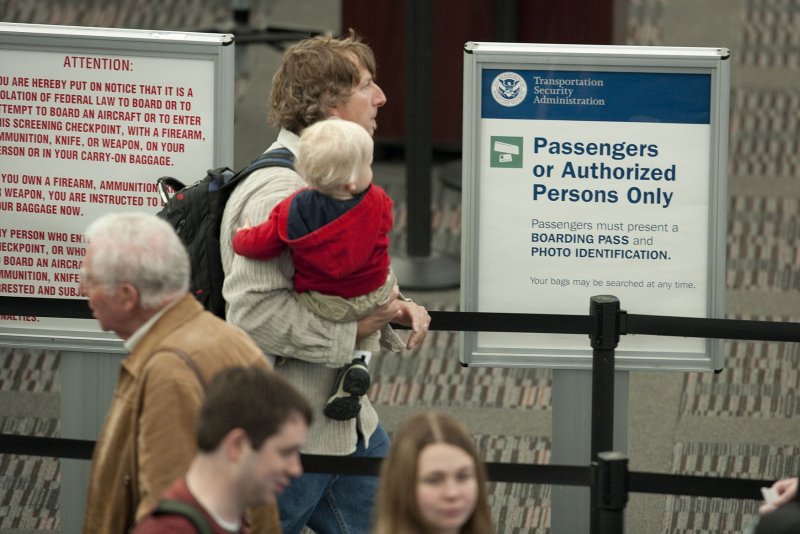The U.S. Department of Homeland Security on Friday announced that five states and one territory that have not yet made changes to comply with the 2005 Real ID Act will get until Jan. 22, 2018, to do so. Under the law, all states and territories must implement stricter requirements for persons to obtain driver's licenses -- a measure intended to increase citizens' safety and make it harder for criminals to obtain phony government-issued identification. Photo by Gary C. Caskey/UPI |
License Photo
WASHINGTON, Jan. 8 (UPI) -- The U.S. Department of Homeland Security on Friday announced that five states that have not yet complied with a 10-year-old federal law mandating stricter driver's license requirements, intended to bolster national security, will have another two years to do so.
DHS Secretary Jeh Johnson said Friday that complying with the department's Real ID law, passed in 2005, is critical to U.S. security in that it makes obtaining a phony state-issued ID tougher for potential criminals.
To date, 23 states and territories are fully compliant and 24 have made enough progress to earn additional time to comply. Three territories are being reviewed for the same extension, but six are deemed "noncompliant" -- including Illinois, Minnesota, Missouri, New Mexico and Washington.
One particular pinch residents of the noncompliant states would feel is that they would need to present a different form of government identification, such as a passport, to board domestic flights -- as driver's licenses would no longer get them past airport security checkpoints.
Some had feared the changes could take effect this year, but Friday's announcement means travelers in those states will be able to use their driver's license to board flights until at least Jan. 22, 2018, Johnson said. Beginning on Oct. 1, 2020, all travelers must possess fully Real ID-compliant identification to board domestic flights.
"Over the next two years, those states that are not REAL ID compliant are strongly encouraged to meet the requirements of the law for the benefit of their residents," Johnson said in a news release Friday.
The Real ID Act was a direct result of the 9/11 terror attacks, as the 2004 investigative commission recommended that the government mandate stricter requirements for persons to obtain state-issued identification.
"The Commission recognized that '[s]ources of identification are the last opportunity to ensure that people are who they say they are and to check whether they are terrorists,'" Johnson's statement said.
"The purposes covered by the act are: accessing federal facilities, entering nuclear power plants, and, no sooner than 2016, boarding federally regulated commercial aircraft," the U.S. Transportation Security Administration says on its website.
Although the law was passed a decade ago, it has not been enforced pertaining to air travel until now.
"The DHS has implemented the law in careful phases, including most recently at military bases, most federal facilities, and nuclear power plants," Johnson said. "Throughout this period, we have worked closely with states to support them in coming into compliance. ... Now it is time to move toward final implementation."
Officials said Friday's extension is intended to give states time to make the necessary changes, such as new laws, to comply with the Real ID Act.
Some states, though, have resisted complying out of privacy concerns -- and some have even passed statutes barring motor vehicle departments from making the changes the law asks for.
Johnson said the DHS will continue efforts to educate the public about developments on this issue and work with states that are not yet fully compliant.
What's the status of each U.S. state/territory?
Compliant: Alabama, Colorado, Connecticut, Delaware, Florida, Georgia, Hawaii, Indiana, Iowa, Kansas, Maryland, Mississippi, Nebraska, Nevada, Ohio, South Dakota, Tennessee, Utah, Vermont, West Virginia, Wisconsin, Wyoming and Washington, D.C.
Made enough changes to merit an extension: Alaska, Arizona, Arkansas, California, Idaho, Kentucky, Louisiana, Maine, Massachusetts, Michigan, Montana, New Hampshire, New Jersey, New York, North Carolina, North Dakota, Oklahoma, Oregon, Pennsylvania, Puerto Rico, Rhode Island, South Carolina, Texas, Virginia
Under review for an extension: Guam, Northern Mariana Islands, U.S. Virgin Islands
Noncompliant: Illinois, Minnesota, Missouri, New Mexico, Washington, American Samoa















